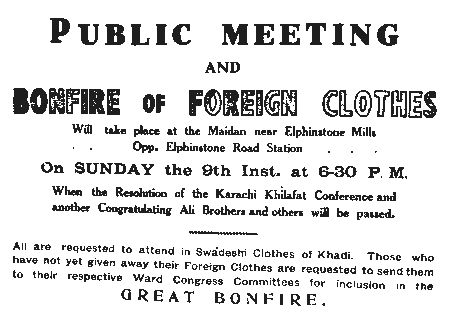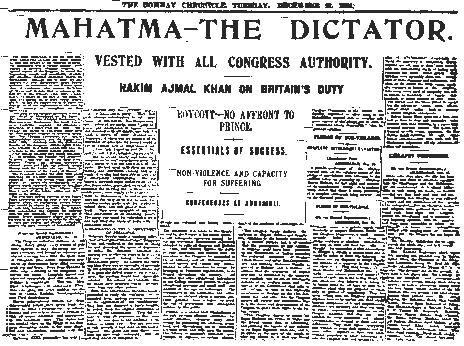The programme of "non-violent non-cooperation" included the boycott of councils, courts and schools, set up by the British and of all foreign cloth. With some naivete Gandhi claimed that his movement was not unconstitutional: in his dictionary, constitutional and moral were synonymous terms. The British saw that the success of "non-cooperation" would paralyse their administration. Lord Chelmsford, the Viceroy, tried to kill with ridicule "the most foolish of all foolish schemes", which would "bring ruin to those who had any stake in the country". A number of eminent "moderate" politicians joined official critics in underlining the risks of mass non-cooperation as proposed by Gandhi That a political programme had no chance of success without an adequate organization to implement it, Gandhi had realized at the age of twenty-five, when he had founded the Natal Indian Congress to fight for the rights of Indians in Natal. The Indian National Congress, had, therefore, to be refashioned, if it was to prove an efficient instrument of non-violent non-cooperation. Gandhi saw that what the country needed was not a forum for an annual pageant and feast of oratory, but a militant organization in touch with the masses. Under the new constitution, the Congress was given a broad-based pyramidal structure by formation of village, taluka, district and provincial committees, with the All India Congress Committee and the Working Committee at the apex. The Congress was thus reorganized not only on a more representative basis, but in such a way that it could function efficiently between its annual sessions. It ceased to be a preserve of the upper and middle classes; its doors were opened to the masses in the small towns and villages whose political consciousness Gandhi himself was quickening. Gandhi was swept to the top of Indian politics in 1919-20 because he had caught the imagination of the people. He was loved and respected as the Mahatma, the great soul; with voluntary poverty, simplicity, humility and saintliness, he seemed a rishi (sage) of old who had stepped from the pages of an ancient epic to bring about the liberation of his country. Nay, to millions he was the incarnation of God. It was not only for his message that people came to him, but for the merit of seeing him. The sacred sight of the Mahatma—his darshan—was almost equivalent to a pilgrimage to holy Banaras. The unthinking adoration of the multitude sometimes made Gandhi feel sick. "The woes of the Mahatma", he wrote, "are known only to the Mahatma". But this adoration was the mainspring from which was drawn the immense influence he exercised over Indian public life. Gandhi had struck some of the inner chords of Indian humanity; his appeal for courage and sacrifice evoked a ready response because he was himself the epitome of these qualities. It was because he was, to use Churchill’s epithet, a "naked faqir", because his life was one of austerity and self-sacrifice that a great emotional bond grew between him and the Indian people. The number of such "faqirs" was to multiply fast. Among those who gave up their lucrative careers and queued up for prison under Gandhi’s leadership were Motilal Nehru, Rajendra Prasad, C.R. Das, Vallabhbhai Patel, and C. Rajagopalachari. Life acquired a new meaning for them. Abbas Tyabji, a former Chief Justice of Baroda, wrote from a village that he was feeling twenty years younger. "God?" he exclaimed, "what an experience ! I have so much love and affection for the common folk to whom it is now an honour to belong. It is the faqir’s dress that has broken down all barriers." It is of this period that Jawaharlal Nehru has written in his autobiography that the movement absorbed him so wholly that he "gave up all other associations and contacts, old friends, books, even newspapers except in so far as they dealt with the work in hand…. I almost forgot my family, my wife, my daughter." From the autumn of 1920, the non-cooperation movement gathered momentum. The attitude of the Government at first was one of caution. It was reluctant to launch a drastic repression, as it did not want to alienate moderate Indian opinion. Soon after his arrival in India in April, 1921, Lord Reading, the new Viceroy, met Gandhi. In a private letter to his son, the Viceroy confessed to a feeling of excitement, almost a thrill, in meeting his unusual visitor and described his religious and moral views as admirable, though he found it difficult to understand his practice of them in politics. Throughout 1921, the tension between the Congress and the Government was steadily mounting. There was no meeting of minds between Gandhi and Reading. The Ali Brothers, the principal leaders of the Khilafat, were arrested in September 1921 on a charge of inciting the army to disloyalty; their offence was repeated by a number of Indian leaders including Gandhi. This was a challenge which was difficult for the Government not to accept. The official optimism that the movement would melt away by internal differences or popular apathy proved to be misplaced. Nearly thirty thousand non-cooperators were arrested. The Government was reluctant to touch Gandhi until a favourable opportunity came. Indeed as late as December 1921, Lord Reading seemed willing to hold a round table conference with Gandhi and other Indian leaders to reach an understanding and to avoid unseemly scenes during the visit to India of the Prince of Wales. Lord Reading was, however, hardly in a position to make any substantial political concessions. Meanwhile, Gandhi was under increasing pressure from his adherents to launch a civil disobedience campaign. The Ahmedabad Congress in December 1921 invested him with authority to launch a mass movement. Mass civil disobedience was, in the words of Gandhi, "an earthquake, a sort of general upheaval on the political plane—the Government ceases to function… the police stations, the courts, offices, etc., all cease to be Government property and shall be taken charge of by the people." He proposed to proceed cautiously. His plan was to launch civil disobedience in one district; if it succeeded he proposed to extend it to the adjacent districts, and so on, until the whole of India was liberated. But he gave a clear warning that if violence broke out in any form in any part of the country, the movement would lose its character as a movement of peace, "even as a lute would begin to emit notes of discord the moment a single string snaps."
A riot which disfigured Bombay during the visit of Prince of Wales in November 1921 had led Gandhi to postpone civil disobedience. Nevertheless, two months later, under growing pressure from his colleagues, he decided to launch a no-tax campaign in Bardoli taluk in Gujarat. He communicated the step he contemplated, with his reasons for it, in a letter to the Viceroy. This was taken by the Government of India as an ultimatum. A head-on collision between the Government on the one hand and the nationalist forces on the other seemed imminent. Gandhi’s letter to the Viceroy was dated February 1,1922. Three days later, there was a clash between a procession and the police at Chauri Chaura, a small village in the United Province, in which the police station was set on fire and 22 policemen were killed. Gandhi viewed the Chauri Chaura tragedy as a red signal, a warning that the atmosphere in the country was too explosive for a mass movement. He decided to retrace his steps, to cancel the plans for civil disobedience in Bardoli, to suspend the aggressive part of the non-cooperation campaign, and to shift the emphasis to the ‘constructive’ programme of hand-spinning, communal unity, abolition of untouchabilty, etc. His action shocked and bewildered his closest colleagues. Their reaction is best expressed in Romain Rolland’s words: "It was dangerous to assemble all the forces of a nation and to hold the nation panting before a prescribed movement, to lift one’s arm to give the final command, then at the last moment, let one’s arm drop and thrice call a halt just as the formidable machinery has been set in motion. One risks ruining the brakes and paralysing the impetus." The Viceroy, Lord Reading, cheerfully confided to his son that Gandhi "had pretty well run himself to the last ditch as a politician by extraordinary manifestation in the last month or six weeks before his arrest". |

